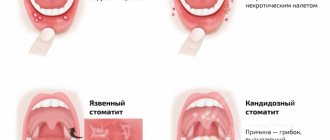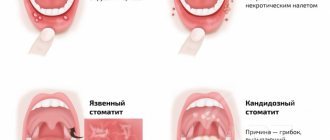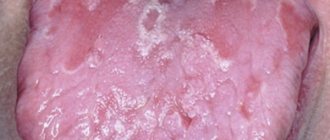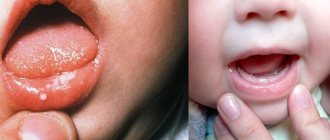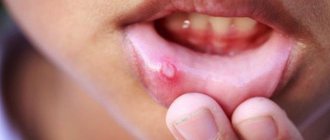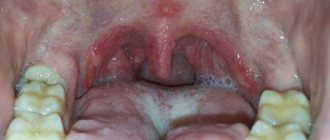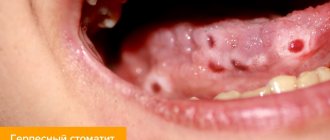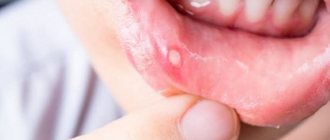Reasons for the development of stomatitis
The causes of damage to the oral mucosa may be:
- Infection (viruses, bacteria, fungal microflora)
- Allergy
- Weakening of the immune system
- Unbalanced diet
- Some diseases (ENT diseases, diabetes mellitus, anemia, gastrointestinal diseases)
- Microtraumas, burns and other damage to the oral mucosa
- Failure to comply with personal hygiene rules
- Taking medications
- Hormonal imbalances
- Smoking (“nicotine stomatitis”)
- Genetic predisposition
Causes of gastroduodenitis
Improper nutrition can cause gastroduodenitis.
The disease can occur under the influence of both external and internal factors. External factors:
- Incorrect diet, violation of diet.
- Side effects of medications.
- Stress
- Drinking alcohol and cigarettes.
Internal factors:
- The bacterium Helicobacter pylori.
- Caries.
- Tonsillitis.
- Diseases of the endocrine system.
- Biliary tract diseases.
- Congenital pathology of the gastric mucosa.
Causes of childhood gastroduodenitis:
- Infection with salmonellosis, E. coli, campylobacter through unwashed and insufficiently processed foods: eggs, meat, seafood, vegetables.
- Rotovirus infection.
- Intestinal Giardia.
- Lactose deficiency.
- Consumption of allergenic foods.
- Drug treatment.
- Poor nutrition: consumption of sausages, chips, carbonated drinks, etc.
Symptoms of stomatitis
Despite the multiplicity of causes, the symptoms of stomatitis are usually similar:
- Pain and discomfort in the mouth that worsens while eating or talking
- Redness of areas of the mucous membrane, their swelling
- The appearance of painful red ulcers with a whitish center on the mucous membrane
- Increased salivation
- Bad breath
- Bleeding gums
- During the acute phase, there may be an increase in body temperature and enlargement of regional lymph nodes
Hexoral in the treatment of stomatitis
For local treatment of stomatitis in children, drugs from the HEXORAL® line can be used.
For irrigation of the oral cavity, the doctor may recommend aerosol HEXORAL® based on hexethidine, which has antiseptic properties7. Thanks to the fine spray, the drug is evenly distributed over the entire surface of the mucosa7. A solution of HEXORAL®8, similar in composition, is intended for rinsing the mouth. Both medications can be used to treat children 3 years of age and older.
Mint-flavored lozenges HEXORAL® TABS based on chlorhexidine and benzocaine may be suitable for boys and girls over 4 years of age9.
For patients with stomatitis over 6 years of age - HEXORAL® TABS CLASSIC based on the antiseptic amylmetacresol. The assortment includes tablets with lemon, orange, black currant, lemon and honey flavors10.
HEXORAL® TABS EXTRA may be suitable for adolescents aged 12 years and older. The lidocaine it contains can relieve even severe pain11.
The information in this article is for reference only and does not replace professional advice from a doctor. To make a diagnosis and prescribe treatment, consult a qualified specialist.
Up to contents
The importance of nutrition during stomatitis
Proper nutrition for stomatitis not only helps speed up recovery, but can also prevent relapse of the disease.
In addition, if the oral mucosa is damaged, almost any food and drink causes severe pain.
This can cause fear of eating and even refusal to eat, which is completely unacceptable. Therefore, it is necessary to eat with stomatitis according to certain rules.
The duration of such a gentle diet is determined by the doctor based on the form and severity of the disease.
Prevention of gastroduodenitis
Having achieved relief, it is important to prevent the disease from returning. To do this you need to follow simple rules:
- Lead a healthy and active lifestyle.
- Continue to follow basic diet recommendations.
- Do not self-medicate.
Gastroduodenitis must be treated to prevent serious complications. Proper and healthy nutrition is an effective means for treating and preventing disease in children and adults.
How to eat with stomatitis
The task of nutrition for stomatitis is to provide the body with all the necessary nutrients, as well as to protect the mucous membrane from irritation as much as possible.
Frequent split meals (5-6 times a day) are recommended. Food must be crushed as much as possible, preferably to a puree state. The temperature of the dishes is 35-40 degrees.
After eating, the mouth must be rinsed with an antiseptic solution prescribed by a doctor or simply with boiled water.
For stomatitis, it is important to drink enough liquid at a comfortable temperature (close to body temperature).
Any degree of dehydration of the body should not be allowed, as this makes the mucous membranes even more vulnerable to inflammation.
General diet rules
A special feature of the diet for this oral disease should be food that is as neutral as possible and does not irritate the mucous membranes. It should be well crushed and have an enveloping and slimy consistency.
When organizing meals for a baby with this disease:
- It is necessary to adhere to small, frequent meals. Portions should be small, and the frequency of intake should be five or six times a day. It will be easier for the baby to eat a small portion, and it will be easier for parents to feed him.
- All food should be crushed as much as possible, and the consistency should resemble puree. Meat and fish are used only in the form of minced meat. The temperature of the food should not be higher than forty degrees, neither hot nor cold.
- Before eating, you can treat the child’s oral mucosa with products containing painkillers. You can use: Kamistad, Kalgel, Cholisal. Also, for pain relief before eating, you can give your baby Ibuprofen or Paracetamol. They will numb the mucous membrane in the mouth. You can safely feed your baby.
- After eating, be sure to rinse your mouth with water at room temperature. Then the mucous membrane is treated. For this, any disinfectant solutions are used (Furacillin, Chlorhexidine, Stomatofit, Miramistin). To do this, you can use decoctions of chamomile or sage herbs. This is done in order to disinfect the lesions and prevent the development of a secondary infectious process.
- It is necessary to apply oils to the mucous membrane that have the ability to activate reparation (recovery) processes.
It is impossible to cope with the disease with diet alone; it must be treated.
Menu for stomatitis
Chopped products should be made from meat: meatballs, meatballs, soufflé, pate. It is good to boil the cereals, giving preference to slimy porridges (oatmeal, rice).
It is better to use cottage cheese in the form of casseroles, and make puree from vegetables.
If you have stomatitis, you should not eat sour vegetables and fruits:
- Citrus
- Green apples
- Tomatoes
- Currant
- Sorrel
- Spinach
The menu should contain a minimum of sweets, and chocolate, sweets, and sweet carbonated drinks are completely excluded.
Simple carbohydrates (sugars) are an ideal environment for the development of bacteria in the oral cavity, so their consumption can worsen the condition and significantly interfere with treatment.
You cannot use coffee, alcohol, or add spices to food. Everything sour, spicy, salty, pickled and smoked is excluded from the diet.
All this irritates the mucous membrane and provokes the appearance of new ulcerations.
For the same reason, you should not eat hard, rough foods: stale bread, fresh hard vegetables and fruits, crackers, waffles and more.
List of recommended products and dishes
- Cream soups and broths
- Minced lean meat (chicken, turkey, beef, rabbit)
- Liver (as pate or soufflé)
- Fish, incl. 1-2 times a week fatty varieties
- Milk and fermented milk drinks
- Cottage cheese, soft cheese
- Unrefined vegetable oils (linseed, olive, corn)
- Various cereals in the form of liquid viscous porridges
- Non-acidic stewed or boiled vegetables, purees from them (cabbage, broccoli, pumpkin, potatoes, zucchini, carrots)
- Non-acidic soft fruits and berries (banana, baked apple, watermelon, melon)
- Compotes, fruit drinks, natural juices from non-acidic vegetables and fruits, jelly
Sample menu for the day
A sample menu is presented to help you understand what to feed your baby.
| Eating | Dishes |
| Breakfast | 1. Sweet oatmeal with milk and butter.2. Raspberry jelly. |
| Lunch | 1. Curd casserole with jam.2. Rose hip decoction. |
| Dinner | 1. Potato puree soup with meat broth.2. Steamed fish cutlet with zucchini puree.3. Dried fruits compote. |
| Afternoon snack | 1. Pudding with fruit puree |
| Dinner | 2. Chicken soufflé with stewed cabbage.3. A glass of Varentz. |
Food should be varied, dishes should not be repeated for at least seven days. Its task is not only to nourish the child in a gentle manner during the period of exacerbation of stomatitis, it should help strengthen the immune system and the body’s defenses.
Diso Nutrimun for stomatitis
Nutrimun protein mixture for stomatitis will be an excellent additional source of complete, easily digestible protein.
Nutrimun is easily mixed into dishes of any consistency, enriching them with protein of the highest biological value.
With Nutrimun, the body will receive the right amount of protein even in small amounts of food or drinks.
This is especially true for stomatitis, when frequent and split meals are indicated, and appetite is reduced due to pain in the mouth.
What is Nutrimun
SBKS Diso Nutrimun are concentrated milk proteins, easy to digest and complete in amino acid composition.
The mixture has virtually no taste or smell, so your favorite dishes will not change their usual characteristics.
With the addition of Nutrimun, the dish is enriched with healthy, easily digestible protein, necessary for the body to function and successfully fight diseases.
How does he help?
Diso Nutrimun is 5 grams of protein per scoop, it was developed by scientists and recommended by doctors for constant use.
You can add it to any dish: soups, broths, purees, soufflés, porridges, etc. You can stir Nutrimun in drinks: tea, compote, jelly.
Nutrimun is a specialized food product that increases and improves the protein part of the diet.
It contains all the amino acids necessary for the body in the correct ratio to each other for better absorption and greater benefits.
The protein of the Diso Nutrimun mixture is not only complete and balanced in amino acid composition, it is easily broken down in the digestive tract and is easily absorbed by the body.
Answers to popular questions
Which doctor treats stomatitis?
The dentist, if necessary, can refer the patient to other doctors.
Do I need to take antibiotics for stomatitis?
Some forms of stomatitis require the use of antibacterial agents, but in most cases this is not only useless, but even dangerous, since it can lead to dysbacteriosis. Antibiotics should be taken only as prescribed by a doctor in the prescribed dosage.
How long does it take to treat stomatitis?
Depends on the severity and form of the disease. On average 7-10 days.
Is stomatitis contagious?
Not all forms of stomatitis are contagious. Traumatic stomatitis is absolutely not contagious. If stomatitis is caused by viruses, such as herpes or measles, the risk of infection is very high.
Summing up
In general, stomatitis can be avoided if preventive measures are taken. To prevent your child from getting sick, follow hygienic feeding standards - be sure to boil dishes, wash your hands thoroughly and wash your breasts. If cracks appear on your nipples, begin treatment immediately. Licking the pacifier and kissing the baby on the lips is also prohibited. Wash toys regularly, do not give him those that have sharp edges (they can damage the baby’s oral mucosa).
If prevention of stomatitis can and should be carried out independently, then treatment should be prescribed exclusively by a doctor
We also note that in older children the disease can be triggered by a decrease in immunity. Any child periodically suffers from colds, and they must be treated on time to avoid complications. And if the pediatrician states that the child belongs to the group of frequently ill people, then it is recommended to consult an immunologist to determine ways to correct immunity.
How to feed a sick baby?
In the first four months, the basis of the diet is formula and breast milk. Do not replace them with anything, but it is important to pay attention to the cleaning of nipples/bottles after each use (wash them thoroughly and boil/sterilize them). Do not lick the pacifier before feeding your baby! To check the temperature of the mixture, it is better to drop it on your wrist. The skin there is more sensitive, so you won’t be mistaken with the temperature of the food.
Boiling the bottle and nipple
Important! When breastfeeding your baby, be sure to wash it with a soda solution every time after feeding him. The fact is that the nipple is a potential source of infection. In addition, wipe the baby's mouth with a bandage pre-soaked in a soda solution.
If you have just started introducing complementary foods to your child, do not give him new foods during the treatment period. It is worth limiting yourself to those that already exist. Give baby cookies soaked in breast milk or a breast milk substitute.
Features of infant feeding
Diagnostic methods
Dentists, pediatricians and pediatric infectious disease specialists treat inflammatory diseases of the mouth in children. During the appointment, the doctor will examine your complaints, review your medical history to identify risk factors, and conduct a physical examination.
As a rule, a general and instrumental examination of the mouth is sufficient to make a preliminary diagnosis, since different forms of stomatitis manifest themselves as peculiar ulcers. Additional research may be required to clarify the nature of the disease.
